Related Research Articles

The terms anno Domini (AD) and before Christ (BC) are used to label or number years in the Julian and Gregorian calendars. The term anno Domini is Medieval Latin and means "in the year of the Lord" but is often presented using "our Lord" instead of "the Lord", taken from the full original phrase "anno Domini nostri Jesu Christi", which translates to "in the year of our Lord Jesus Christ". The form "BC" is specific to English, and equivalent abbreviations are used in other languages: The Latin form is Ante Christum natum but is rarely seen.
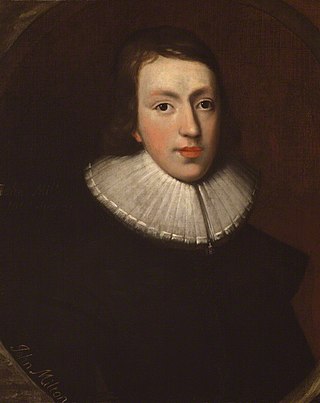
John Milton was an English poet and intellectual. His 1667 epic poem Paradise Lost, written in blank verse and including over ten chapters, was written in a time of immense religious flux and political upheaval. It addressed the fall of man, including the temptation of Adam and Eve by the fallen angel Satan and God's expulsion of them from the Garden of Eden. Paradise Lost elevated Milton's reputation as one of history's greatest poets. He also served as a civil servant for the Commonwealth of England under its Council of State and later under Oliver Cromwell.

Samson Agonistes is a tragic closet drama by John Milton. It appeared with the publication of Milton's Paradise Regained in 1671, as the title page of that volume states: "Paradise Regained / A Poem / In IV Books / To Which Is Added / Samson Agonistes". It is generally thought that Samson Agonistes was begun around the same time as Paradise Regained but was completed after the larger work, possibly very close to the date of publishing, but there is no certainty.
In the Eastern Orthodox Church, the feast of the Resurrection of Jesus, called Pascha (Easter), is the greatest of all holy days and as such it is called the "feast of feasts". Immediately below it in importance, there is a group of Twelve Great Feasts. Together with Pascha, these are the most significant dates on the Orthodox liturgical calendar. Eight of the great feasts are in honor of Jesus Christ, while the other four are dedicated to the Virgin Mary — the Theotokos.

The Feast of the Circumcision of Christ is a Christian celebration of the circumcision of Jesus in accordance with Jewish tradition, eight days after his birth, the occasion on which the child was formally given his name.
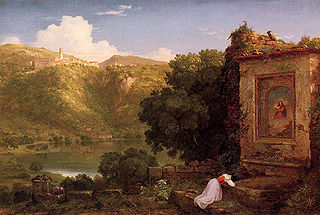
Il Penseroso is a poem by John Milton, first found in the 1645/1646 quarto of verses The Poems of Mr. John Milton, both English and Latin, published by Humphrey Moseley. It was presented as a companion piece to L'Allegro, a vision of poetic mirth. The speaker of this reflective ode dispels "vain deluding Joys" from his mind in a ten-line prelude, before invoking "divinest Melancholy" to inspire his future verses. The melancholic mood is idealised by the speaker as a means by which to "attain / To something like prophetic strain," and for the central action of Il Penseroso – which, like L'Allegro, proceeds in couplets of iambic tetrameter – the speaker speculates about the poetic inspiration that would transpire if the imagined goddess of Melancholy he invokes were his Muse. The highly digressive style Milton employs in L'Allegro and Il Penseroso dually precludes any summary of the poems' dramatic action as it renders them interpretively ambiguous to critics. However, it can surely be said that the vision of poetic inspiration offered by the speaker of Il Penseroso is an allegorical exploration of a contemplative paradigm of poetic genre.
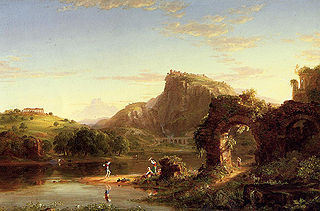
L'Allegro is a pastoral poem by John Milton published in his 1645 Poems. L'Allegro has from its first appearance been paired with the contrasting pastoral poem, Il Penseroso, which depicts a similar day spent in contemplation and thought.

Milton's 1645 Poems is a collection, divided into separate English and Latin sections, of John Milton's youthful poetry in a variety of genres, including such notable works as An Ode on the Morning of Christ's Nativity, Comus and Lycidas. Appearing in late 1645 or 1646, the octavo volume, whose full title is Poems of Mr. John Milton both English and Latin, compos'd at several times, was issued by the Royalist publisher Humphrey Moseley. In 1673, a year before his death, Milton issued a revised and expanded edition of the Poems.

Eikonoklastes is a book by John Milton, published October 1649. In it he provides a justification for the execution of Charles I, which had taken place on 30 January 1649. The book's title is taken from the Greek, and means "Iconoclast" or "breaker of the icon", and refers to Eikon Basilike, a Royalist propaganda work. The translation of Eikon Basilike is "icon of the King"; it was published immediately after the execution. Milton's book is therefore usually seen as Parliamentarian propaganda, explicitly designed to counter the Royalist arguments.
Of Reformation is a 1641 pamphlet by John Milton, and his debut in the public arena. Its full title is Of Reformation Touching Church-Discipline in England.
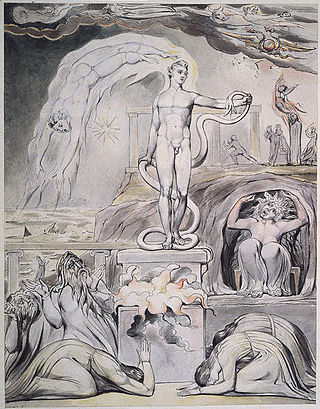
On the Morning of Christ's Nativity is a nativity ode written by John Milton in 1629 and published in his Poems of Mr. John Milton (1645). The poem describes Christ's Incarnation and his overthrow of earthly and pagan powers. The poem also connects the Incarnation with Christ's Crucifixion.
The Passion is an unfinished ode by John Milton that was possibly written in 1630 and was first published in 1645 or 1646. The poem connects Christ's Crucifixion with his Incarnation. It is linked to two other poems of Milton: On the Morning of Christ's Nativity and Upon the Circumcision
Arcades is a masque written by John Milton and performed on 4 May 1634. The piece was written to celebrate the character of Alice Spencer, the Countess Dowager of Derby, widow of Ferdinando Stanley, 5th Earl of Derby, during her 75th birthday. The masque distinguishes Spencer as having a greater far superior to other noble women by titling Spencer as queen of a metaphorical Arcadia that is far superior to any other realm. The piece served as a basis for Milton's later masque, Comus.
A Treatise of Civil Power was published by John Milton in February 1659. The work argues over the definition and nature of heresy and free thought, and Milton tries to convince the new English Parliament to further his cause.
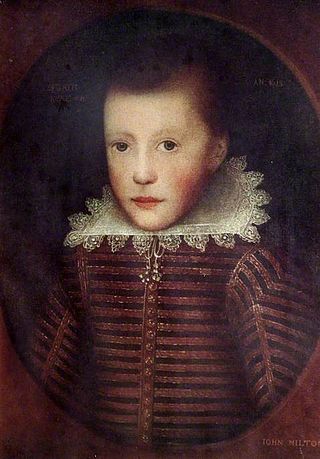
John Milton wrote poetry during the English Renaissance. He was born on 9 December 1608 to John and Sara Milton. Only three of their children survived infancy. Anne was the oldest, John was the middle child, and Christopher was the youngest.
Politics were an important part of John Milton's life. Milton enjoyed little wide-scale early success, either in prose or poetry, until the production of his later, controversial political works starting with The Tenure of Kings and Magistrates and Eikonoklastes.
The reception history of John Milton and his works has been a mixture of positive and negative responses, with his greatest influence being found within his poetry.

The poetic style of John Milton, also known as Miltonic verse, Miltonic epic, or Miltonic blank verse, was a highly influential poetic structure popularized by Milton. Although Milton wrote earlier poetry, his influence is largely grounded in his later poems: Paradise Lost, Paradise Regained, and Samson Agonistes.

William Blake drew and painted illustrations for John Milton's nativity ode On the Morning of Christ's Nativity between 1803 and 1815. A total of 16 illustrations are extant: two sets of six watercolours each, and an additional four drawings in pencil.
Nationality words link to articles with information on the nation's poetry or literature.
References
- Corns, Thomas. "'On the Morning of Christ's Nativity', 'Upon the Circumcision' and 'The Passion'" in A Companion to Milton. Ed. Thomas Corns. Oxford: Blackwell Publishing, 2003.
- Kerrigan, William; Rumrich, John; and Fallon, Stephen (eds).The Complete Poetry and Essential Prose of John Milton. New York: The Modern Library, 2007.
- Shawcross, John. John Milton: The Self and the World. Lexington: University Press of Kentucky, 1993.
